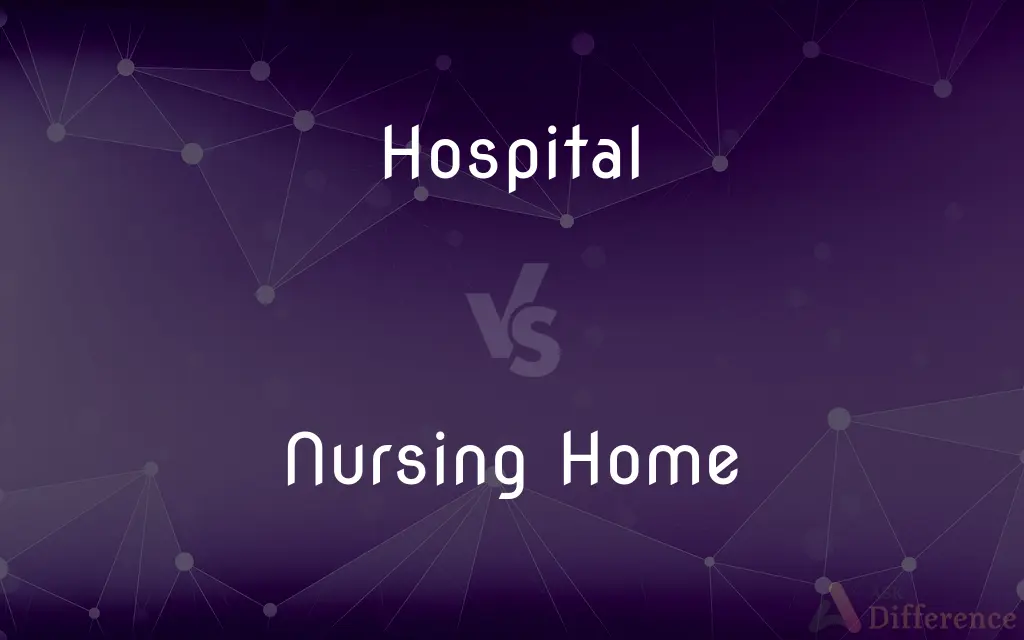Hospital vs. Nursing Home — What's the Difference?
By Tayyaba Rehman — Published on December 12, 2023
Hospital is a facility for medical treatment. Nursing Home is a residence for elderly or disabled requiring chronic care.

Difference Between Hospital and Nursing Home
Table of Contents
ADVERTISEMENT
Key Differences
A hospital is primarily a medical institution that offers treatment and care for patients with acute medical conditions. A nursing home, on the other hand, is more oriented towards providing long-term care for elderly or disabled individuals who might not have acute medical issues but need assistance with daily living activities.
In a hospital, patients usually stay for a short period until they recover from a surgery, injury, or illness. Nursing homes are designed for longer stays where residents might live for months or even years, requiring consistent care and supervision.
Most hospitals are equipped with advanced medical technology, emergency rooms, operating theaters, and specialized departments for various medical conditions. Nursing homes, while they may have medical facilities on-site, generally focus on providing a comfortable living environment with basic medical oversight.
Doctors, surgeons, and specialists primarily staff a hospital, offering specific treatments and surgeries. In contrast, a nursing home typically has nurses, caregivers, and sometimes therapists to aid residents in their daily routines.
Both hospitals and nursing homes play crucial roles in healthcare. While hospitals handle immediate medical needs and emergencies, nursing homes cater to the long-term care and well-being of their residents.
ADVERTISEMENT
Comparison Chart
Primary Purpose
Treat acute medical conditions.
Provide long-term care for elderly/disabled.
Duration of Stay
Short-term, until recovery.
Long-term, often months to years.
Staff
Doctors, surgeons, specialists.
Nurses, caregivers, therapists.
Equipment/Facilities
Advanced medical technology, ERs, operating theaters.
Basic medical facilities, living accommodations.
Patients/Residents
People with acute medical issues.
Elderly/disabled needing daily assistance.
Compare with Definitions
Hospital
A medical institution for patient treatment.
I was admitted to the hospital for surgery.
Nursing Home
An establishment where nurses care for the aged.
We visited Mrs. Smith in the nursing home on Sunday.
Hospital
A place where doctors and nurses provide healthcare.
The nearest hospital is ten miles away.
Nursing Home
A residence for elderly requiring assisted living.
My grandmother moved to a nursing home last year.
Hospital
An establishment for the diagnosis and treatment of diseases.
After the accident, he was rushed to the hospital.
Nursing Home
A place offering daily assistance and basic medical oversight.
His recovery after surgery continued in a nursing home.
Hospital
A facility offering specialized medical care.
She works at a hospital that focuses on cardiac issues.
Nursing Home
A facility for long-term care of the elderly/disabled.
The nursing home provides physical therapy sessions for residents.
Hospital
A building where medical staff treat illnesses and injuries.
The new hospital has state-of-the-art equipment.
Nursing Home
A residence where caregivers assist with daily living activities.
After her fall, she needed a nursing home with 24-hour care.
Hospital
A facility that provides emergency, inpatient, and usually outpatient medical care for sick or injured people.
Hospital
A facility that provides veterinary care for sick or injured animals.
Hospital
Chiefly British A charitable institution, such as an orphanage or a home for the elderly.
Hospital
A repair shop for specified items
A doll hospital.
Hospital
(Archaic) A hospice for travelers or pilgrims.
Hospital
A large medical facility, usually in a building with multiple floors, where seriously ill or injured patients are given extensive medical and/or surgical treatment.
Hospital
A building founded for the long-term care of its residents, such as an almshouse. The residents may have no physical ailments, but simply need financial support.
Hospital
(obsolete) A place of lodging.
Hospital
(obsolete) Hospitable.
Hospital
A place for shelter or entertainment; an inn.
Hospital
A building in which the sick, injured, or infirm are received and treated; a public or private institution founded for reception and cure, or for the refuge, of persons diseased in body or mind, or disabled, infirm, or dependent, and in which they are treated either at their own expense, or more often by charity in whole or in part; a tent, building, or other place where the sick or wounded of an army cared for.
Hospital
Hospitable.
Hospital
A health facility where patients receive treatment
Hospital
A medical institution where sick or injured people are given medical or surgical care
Common Curiosities
What is the main role of a nursing home?
To provide long-term care and daily assistance for the elderly or disabled.
Do hospitals have long-term care facilities like nursing homes?
Typically no, hospitals focus on acute medical care.
What is the primary purpose of a hospital?
To treat and care for patients with acute medical conditions.
Can one move from a hospital to a nursing home for recovery?
Yes, many individuals transition to nursing homes for extended recovery.
Can patients receive surgeries in nursing homes?
Generally, no. Surgeries are conducted in hospitals.
Are there medical specialists in nursing homes?
Some nursing homes may have specialists, but it's more common in hospitals.
How long do patients typically stay in a hospital?
Usually short-term, until recovery from illness, injury, or surgery.
Are nursing homes only for the elderly?
Primarily, but they also serve disabled or chronically ill individuals of various ages.
Are all medical professionals in nursing homes nurses?
No, nursing homes can also have therapists, doctors, and other caregivers.
Do hospitals provide care for the elderly like nursing homes?
Not in the same way. Hospitals treat medical conditions, not long-term assisted living needs.
What types of therapies are offered in nursing homes?
Physical, occupational, speech therapies, among others, depending on the facility.
How are hospitals different from clinics?
Hospitals are larger, offer a wider range of services, and are equipped for surgeries and emergencies.
How do I choose a good nursing home?
Look for staff-to-resident ratio, cleanliness, resident feedback, and available services.
What facilities are common in a hospital?
ERs, operating theaters, specialized departments, and advanced medical equipment.
Are there specialized nursing homes like specialized hospitals?
Yes, some nursing homes specialize in conditions like dementia or specific types of therapy.
Share Your Discovery

Previous Comparison
Cladogram vs. Phylogenetic Tree
Next Comparison
Metallic Minerals vs. Non-metallic MineralsAuthor Spotlight
Written by
Tayyaba RehmanTayyaba Rehman is a distinguished writer, currently serving as a primary contributor to askdifference.com. As a researcher in semantics and etymology, Tayyaba's passion for the complexity of languages and their distinctions has found a perfect home on the platform. Tayyaba delves into the intricacies of language, distinguishing between commonly confused words and phrases, thereby providing clarity for readers worldwide.
















































